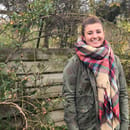Wisconsin may be known as the Cheese State or America’s Dairyland, but if you take a closer look, you’ll find a wider range of food and product that come out of our bountiful Badger State.
Even more diverse, however, are the people producing our food and the way that they do it – the hands that dig into the ground to plant peppers in Allenville, Wisconsin are different from the hands that are performing an ultrasound on a cow in Johnson Creek. They are different from a child’s hands that are discovering food coming out of the soil for the first time in Milwaukee or learning about the responsibility it takes to raise an animal in Jefferson County.
All photos provided by the Lands We Share initiative; children in the Young Cats program work in the Metcalfe Park Legacy Garden in Milwaukee; the youngest Dettmann boy of the Dettmann Dairy Farms in Johnson Creek with his hen.
These hands share something in common: a love for the land. The land that helps them feed the growing world population, the niche markets that appeal to consumers in our state, their community that is rebuilding their lost culture, or their neighborhood that doesn’t have access to fresh produce.
These hands belong to men AND women in agriculture. Women who care for their land by stopping pesticide use, women who help their communities by introducing them to the bounty that the land provides, and women who continue to work hard and show great pride in what they do for their tribe.
Chia Vang of Vang C&C Farms in Jefferson County looking over an Asian pear tree; Danell Cross, director of Metcalfe Legacy Garden, speaking to her students.
These hands come from all backgrounds of ethnicity that play a role in how land is used. Hmong hands are letting their food grow in a natural, organic way; the hands of African Americans are using vacant land in their urban community to educate and provide; the Oneida hands are growing and braiding sacred white corn in order to ensure their recently revived culture remains strong in their community.
An Oneida woman is braiding white corn, the finished braids are hanging from the ceiling; a Latino worker at Allen Family Farm in Allenville is spraying the dirt off of the pumpkins before taking them to the farmers market.
The Lands We Share exhibit at the Discovery Building features five unique farm sites representing Wisconsin’s extraordinary, but often overlooked, cultural diversity in farming and food production. At its core – a public engagement and community dialogue tour that has brought together farmers and farm workers across Wisconsin regions – urban and rural – as a response to deep cultural and political divisions in the state. These community dinners and conversations take place at each farm’s community.
On Oct. 17, the first community dinner and conversation took place at the Allenville Grange Hall near Winneconne. The Allenville Grange hall was opened up after years of being boarded up for the Community Dinner and Conversation event.
As the project has finished its last community dinner and conversation, the exhibit is still traveling – now at the Discovery Building until April 28 – and hosting a final gala on May 16 at the Madison Public Library.
The final gala will be the first occasion when members of all five communities will be together in one location. It will be a lot of fun and no doubt a fascinating evening with opportunities to view the traveling exhibit, participate in a public conversation about local issues related to food, farming, and community, and to have a locally sourced, farm-to-table meal.
The Lands We Share tour is an initiative of the Wisconsin Farms Oral History Project, a rare collaboration of four UW campuses (Oshkosh, Madison, Milwaukee and Whitewater).
The farm sites include the Oneida Nation Farm, an active farm, 4-H youth club, and farmers’ market; The Allen Family Farm, a family farm in Winneconne that works closely with migrant and immigrant workers of predominantly Mexican and Hmong descent; The Vang C&C Farm in Jefferson County, the first Hmong farm to be organically certified in the state of Wisconsin; Dettmann Dairy Farms in Johnson Creek; and The Metcalfe Park Community Garden in Milwaukee, which serves predominantly African-American residents. You can learn more about each farm via their Wisconsin Life series.



